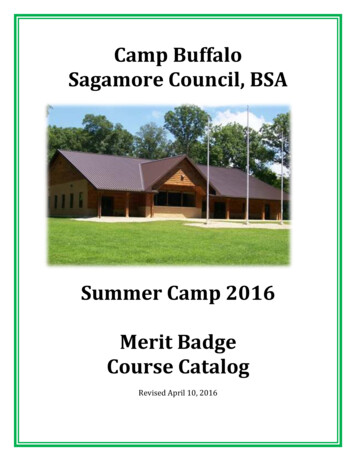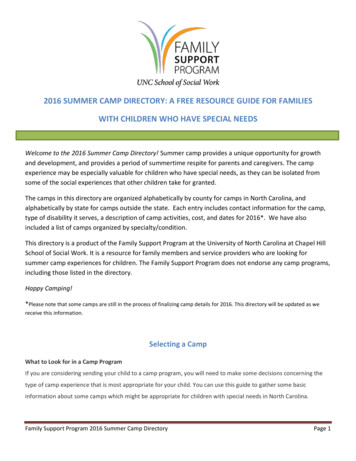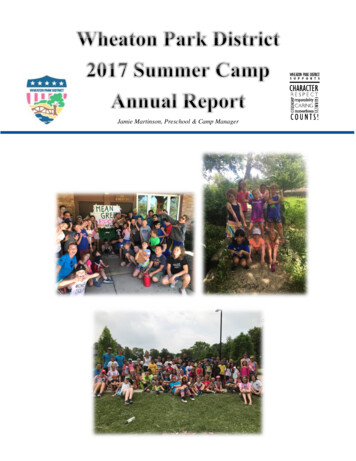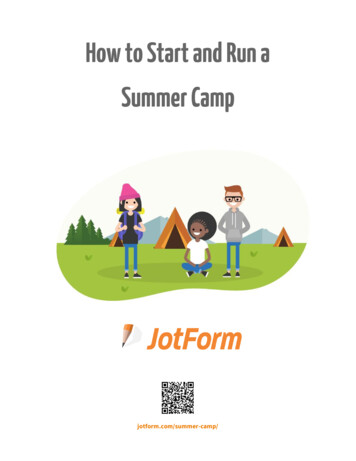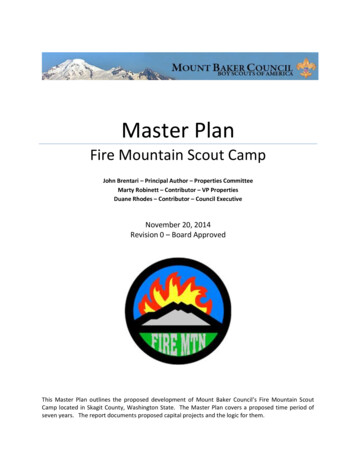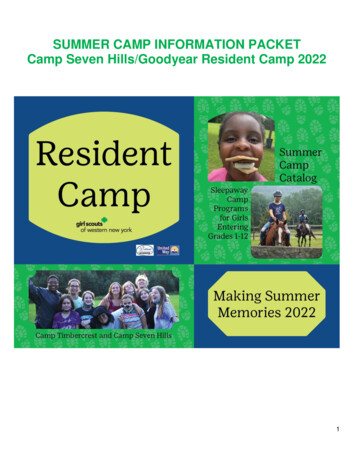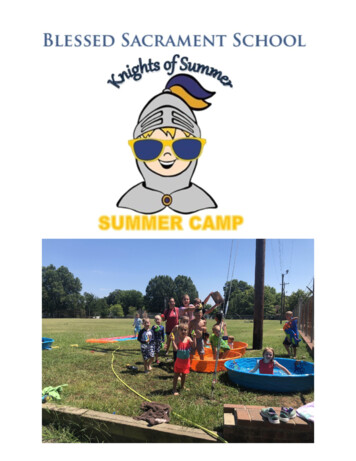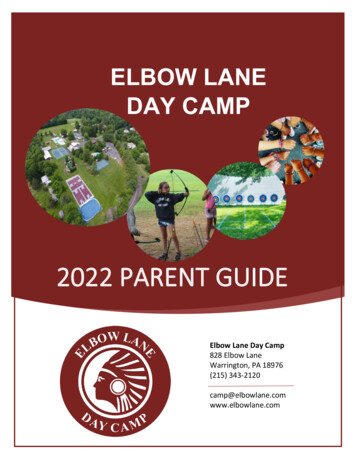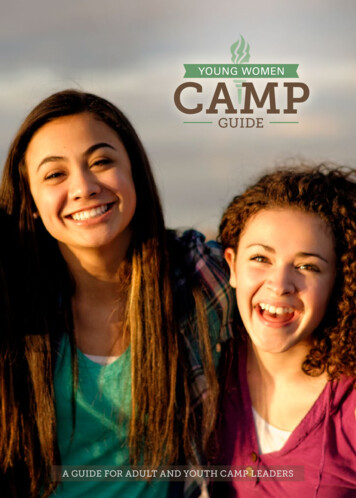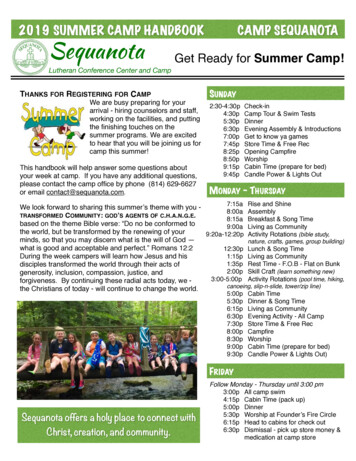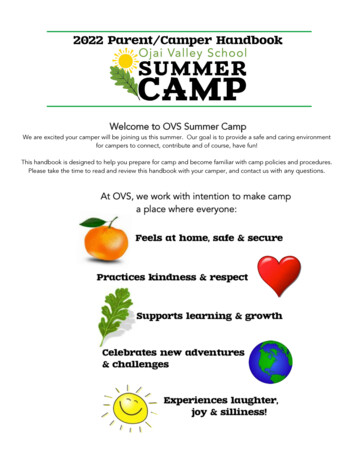
Transcription
Welcome to OVS Summer CampWe are excited your camper will be joining us this summer. Our goal is to provide a safe and caring environmentfor campers to connect, contribute and of course, have fun!This handbook is designed to help you prepare for camp and become familiar with camp policies and procedures.Please take the time to read and review this handbook with your camper, and contact us with any questions.
SUMMER CAMP CONTACT INFORMATIONCamp Office: (805) 646-1423Director of Summer Programs: Ben Malkin, email: bmalkin@ovs.orgAssistant Director of Summer Programs: John Rowan, email: jrowan@ovs.orgDirector of Equestrian: Stephanie Gustafson, email: sgustafson@ovs.orgHealth Center: (805) 646-1423, ext. 1238, email: healthcenter@ovs.orgCAMP COMMUNITYThe community at OVS is the basis of your camper’s summer experience. Learning to work alongside others andcontributing to camp is key to a successful summer. Campers should arrive at camp with a cooperative and positiveattitude, ready to learn and play in a group environment. Campers will be guided with respect by camp staff and areexpected to treat each other and the faculty and staff with that same respect. As a part of the community, campers willpitch in with crew jobs, cafeteria clean up, grounds and classroom upkeep.COVID-19 and CAMPWe continue to monitor the COVID-19 case rates locally and the new updates from the Centers of Disease Control(CDC) nationally. As we prepare to open camp, we will follow the current health protocols recommended by the CDCfor summer camps to ensure a safe experience for everyone.MONEY and VALUABLESCampers are discouraged from bringing money or valuables of any kind to camp.CAMP STOREThe store sells souvenir items such as T-shirts, sweatshirts, hats etc. as well as sundries and school supplies. You mayleave a credit to be kept on file for your camper to purchase items in the camp store, which will be Tuesdays andFridays.CELL PHONE and SMART WATCH POLICYCamp at OVS is a unique opportunity for children to practice independence and make meaningful connections withothers in a safe and nurturing environment. In order to maintain that environment and provide the highest level ofreward for our campers, we allow very limited cell phone/smart-watch use during the summer program.Campers are encouraged to leave their phones at home, however if phones are brought to Camp, campers may notuse them during the camp day. In the event that a camper does need to call home, a teacher or another school officialwill contact you on their behalf. We understand this policy may be uncomfortable for some, however we ask that yousupport it and allow your camper to reap the benefits of independence.MEALSMeals are freshly prepared on-site by our OVS Food Service team. Included in tuition, day campers receive morningand afternoon snack as well as lunch. Resident campers receive all meals and snacks. Please make sure to list anyallergies on your camper’s health forms. If you have concerns about your child’s dietary needs, please contact theDirector of Summer Programs. We can accommodate most needs, but will consult with health and kitchen staff ifallergies are severe.ACADEMIC CLASS and COMMUNICATIONAt the start of the program, parents will receive instruction on how to access the SeeSaw app where OVS and theCamp Staff will post and share pictures, videos and class updates.Teachers will communicate class information and updates via the email provided at registration. Please make sureyour contact information is current, so you receive the most up-to-date information.
DAY HIKES or OVERNIGHT CAMPING (subject to change)As an extension of our camp mission, campers 8-15 years old may have the opportunity to participate in overnightcamping trips or day hike excursions during their session. Camping trips may take place at Lower Campus, UpperCampus, Lake Casitas or Pine Mountain. Camping and hikes may include outdoor education games and activities, andteam building exercises. Additional information and the specific schedule for your camper’s session will be sent to youby email notification.DRESS CODECampers are expected to wear clothing and footwear that is modest and appropriate for an active camp program. Ourgoal is to focus on what campers are doing, not what they are wearing. Camp clothing will get dirty and worn soplease don't pack your best items. All clothing items should be marked with camper’s FULL name in indelible ink orsew on patches. Respect for the camp dress code is an important component of community cooperation, and isexpected of all campers.Attire should be neat, size appropriate, cover undergarments and may not be ripped or torn. Campers should wear T-shirts, shorts and athletic type shoes for recreational activities. Flip flops not allowed Shorts should not be too long, too short or too tight for active play. Tops should cover undergarments and may not expose midriff. Athletic shoes or sandals with heel straps are required during activities. Clothing relating to alcohol, drugs, violence, death, sexual innuendo or containing bad language areunacceptable. If worn, jewelry must be modest and may need to be removed for safety purposes. Bathing suits should be modest and appropriate for active swimming and play (one- piece encouraged) Hair should be one natural color and hairstyles should not be extreme. Piercings are allowed in ears only.CODE OF CONDUCTThe Ojai Valley School and Camp expects campers to show respect for each other, the staff, the property of othersand the policies and procedures of the school and camp at all times. In recognition of the Camp’s responsibilities tothe law and to other members of the community, there are major infractions which will be handled seriously and mayresult in immediate dismissal without refund.They are as follows: Violations involving drugs and alcohol, which include, but are not limited to: Use and/or possession of anyharmful drugs or chemicals and/or paraphernalia; use and/or possession of alcohol, use and/or possession ofmarijuana, use and/or possession of cigarettes, electronic cigarettes or tobacco. Use or possession of any weapons is against camp rules. This includes guns (real or play), knives, slingshots,and any other implement designed for or used to harm or threaten others. Unauthorized absence from camp, or leaving off campus excursions without permission. Violations of honesty, integrity, and consideration of other members of the school community which includebut are not limited to: lying, academic dishonesty, stealing, willful property damage, harm to oneself, harm toanother camper or threats to others, any activity which would disrupt the operation of camp. Campers may not create a hostile environment for one another, which includes teasing, taunting, bullyingand/or harassment. Involvement in explicit sexual activity. Violations involving computers and telecommunications including, but are not limited to: misuse of computerequipment; introduction of computer viruses; unauthorized access of on-line services, misuse of electronicmailing services, including telephones, to harass, intimidate or bully the internal or external part or person ofthe Ojai Valley School and Camp community; use of the internet, computer software or video gamesinvolving acts of violence, racial hatred, drugs, alcohol, explicit sex; and misuse of social media.MEDICATION If a camper has prescribed daily medication that must be taken while at Camp, our Medication Form must becompleted and signed by the parent and Healthcare provider and returned to our Health Center at least twoweeks prior to the start of your camp session.
MEETING GUIDELINES for HEALTH and WELLNESSOur goal is to provide a healthy camp experience that can be run safely. The health and well-being of our campers andstaff is our top priority. In establishing our health protocols for camp, we intend to follow the guidance of:Centers for Disease Control and Prevention (CDC)California Department of Public Health (CDPH)Ventura County Public Health (VCPH)American Camp Association (ACA)This includes the Field Guide for Campers for the Implementation of the CDC Guidance from the EnvironmentalHealth Engineers (EHE), which was prepared for the American Camping Association.In the event of a public health crisis, Ojai Valley School’s health policies may be modified to correspond with thoseguidelines set forth by the Centers for Disease Control or the Ventura County Public Health Department.In a combined effort from camp administrators, medical staff, counselors, parents, and campers we want to ensure thehealth and safety of all participants are protected. Please monitor your children for any COVID symptoms and keepthem home if they are sick. Working together we can help to prevent the spread of the virus.To support these efforts, campers must have all camp health forms, current immunizations, and health insuranceinformation on file prior to June 1. If immunizations are not current, campers will need to provide a medical exemptionsigned by a Physician, Physician’s Assistant or a Nurse Practitioner.All medical releases, orders and recommendations written by a licensed doctor or nurse practitioner must besubmitted to the Health Center (healthcenter@ovs.org), which will then confidentially convey the information to theappropriate staff members.Our Health Center maintains a team of highly qualified and compassionate nurses who care for all campers. Inaddition, all camp faculty and staff are CPR and First Aid Certified. During off hours, the nurse on duty can be reachedby cell phone for emergencies. If a resident camper becomes ill and needs to be isolated, staff will remain overnightwith the camper. Ojai Valley Community Hospital is located a short distance from Ojai Valley School, where a physicianis on duty 24 hours a day in the unlikely event that an emergency does occur.PARTICIPATION GUIDELINES and HEALTH CENTER PROTOCOLSTo ensure the safety of the campers and staff, the following protocols will be in place: Staff and campers are required to provide a negative COVID test result taken within 72 hours from the start ofcamp. Results must be submitted to healthcenter@ovs.orgFrequent hand washing will be encouraged for everyoneCoughing, sneezing etiquette (into the elbow or tissue) will be discussed to stop the spread of germsClassrooms, outdoor group areas, tables, restrooms and campus grounds will be cleaned frequently andsanitized throughout the camp day.Anyone who would like to keep wearing a mask at camp is encouraged to do so, and we strongly recommendwearing mask in any crowded settings in which social distancing cannot be maintained. Circumstances in which a camper should not attend Camp when they have any of the follow symptoms: Temperature is high than 99.5 FCoughFatigueHeadacheSore throatNausea/Vomiting/Diarrhea Fever or chillsShortness of breath or difficulty breathingMuscle or body achesNew loss of taste or smellCongestion or runny nose
Circumstances in which a camper is admitted to the Health Center for observation: FeverNausea/Vomiting/DiarrheaInjuries, including all head injuriesSevere pain/headacheAllergic reactionIllness of unknown etiologyAny health concern which inhibits class participationCircumstances in which a parent is to be notified: Any illness or injury requiring further medical assessmentCamper sustains head injury, or any type of facial injuryFever over 99.5F degrees – orallySuspected joint sprainsAny illness, or symptoms of an illness, that differs from student’s historical informationDental emergenciesDemonstration of psychological behavior out of character from student’s historical informationBefore and after any doctor’s visit to relay information regarding diagnosis, treatment and laboratory resultsIf a camper requires medicationBefore any credit card number on file is used for medical services or medication purchasedCircumstances in which a day camper may be sent home: (if your child is experiencing any of these symptoms pleasekeep them home) Fever over 99.5 degrees – orallyDiarrhea or vomitingAny unusual discharge or drainage from the eyes, nose, ears or woundsWhen diagnosed by a doctor as having a communicable disease requiring isolationIf camper has pediculosis (head lice) and has not received treatmentWhen diagnosed with a condition that requires 24 hour observation by a nurseCamper requires treatment out of the scope of the school nurse practiceCamper is found to be a threat to himself/herself or to othersWhen diagnosed with an illness requiring intensive education and treatment (example: Diabetes)When a day camper may come back to camp: If camper has been fever-free for at least 24 hoursIf vomiting and/or diarrhea have stopped for 24 hoursIf symptoms of cold/flu are over, may attend school with a minor, clear fluid nasal dripIf eye irritation and drainage have stopped and medical treatment receivedIf an infectious wound is properly covered and medical treatment receivedIf after being diagnosed with a communicable disease that requires isolation (i.e. Chicken Pox), the doctorprovides a written release for the student to return to schoolIf pediculosis is being effectively treatedFollowing a mental health crisis, a doctor provides a written release for the student to returnFollowing surgery, significant injury, or having received a new diagnosis of a major illness, a doctor mustprovide a written release to attend school and explicit instructions regarding care, medication administrationand follow-up treatmentAll medical releases, orders and recommendations written by a licensed doctor or nurse practitioner must besubmitted to the Health Center, which will then confidentially convey the information to the appropriate staffmembers.During a public health crisis, Ojai Valley School’s health policies may be modified to correspond with those interimguidelines set forth by the Centers for Disease Control or the Ventura County Public Health Department.
DAY CAMPERSDAILY DROP-OFF and PICK-UP SCHEDULE Day Camp Classes begin at 8:30 a.m. and ends at 4:30 p.m. Our Camp Office will contact you with specificinstructions. Each family will be given a name card to be displayed in your car during your pick-up session. We ask that you please have your name card visible in your right-hand visor or dashboard, so we can see yourcamper’s name. Additional name cards are available upon requestDAY BUSOVS provides day bus service for campers living in the Ventura area. Our transportation department continues with allnecessary health precautions by customizing our buses with socially distanced seating and protocols for safeloading and unloading of passengers. The bus stops are located at:Marina Park Beach,1400 Greenock Lane, VenturaDAILY ATTENDANCE and COMMUNICATIONParents should contact the Camp Office if the camper will not be attending that day, or will be picked up/and or leaveearly for any reason throughout the day.BRING TO CAMP 2 face masks daily Bathing suit appropriate for active swimming Backpack/Book bag Water bottle (OVS will provide every camper with a water bottle upon arrival) Pool towel Sun hat/baseball cap SunscreenEQUESTRIAN(In addition to the items listed above, the following equipment is required for campers who are registered inEquestrian Program: Riding bootsEquestrian helmet (ASTM-SEI approved)Breeches, or Long pantsShirt with sleeves
RESIDENT CAMPERSARRIVING AT CAMP and DEPARTING FROM CAMPResident Campers should arrive at camp at 2:00 p.m. on the Sunday their session begins. Please plan your travelaccordingly. Unfortunately, we are not able to accommodate early arrivals. All campers are required to provide a negativeCOVID test result taken within 72 hours from the start of camp. Results must be submitted to healthcenter@ovs.orgAt the end of your camp session, all resident campers must be picked up by 10:00 a.m. on the Saturday that theirsession concludes.DORM LIFE and CREW JOBSResident campers will have their own dorm rooms and will be assigned a bathroom, shower and sink to share withintheir cohort group. Dorm counselors will have their own room or apartment that is separate but in the same wing ofthe dorm.Resident campers are responsible for the daily cleaning of their rooms, making their beds, doing their personal laundryand other jobs related to their living environment. This will include cleaning common areas of the dorm, dining halland recreational areas. As campers work together to care for the camp and the community, valuable skills are learnedand independence and responsibility are strengthened.We also encourage parents to mail letters to their resident campers. Resident campers will receive mail (either email orpost) each evening at dinner.Please address mail to CAMPER: Your child’s name at 510 Country Club Dr. Ojai, CA 93023.LAUNDRYCampers will be guided by counselors and instructed in the cleaning of their own laundry. Washers and dryers arelocated on campus in/near each dormitory. Laundry will be done as scheduled on the weekends, and soap andquarters will be provided. Campers are responsible for gathering their items (in their laundry bag) and after washingand drying, returning their items to their dorm room. Counselors will supervise laundry time, and campers will learnvaluable skills as they prep for the start of a new camp week.CALLS HOMECamp is about leaving home and building the confidence needed to take care of yourself and find your place in a newcommunity. It is also a time for parents to trust their children and allow for the growth and maturity camp can offer. Tothat end, we will limit parent contact (other than letters and email messages, which can be sent to ovs@ovs.org) toweekend communications.Resident campers will be discouraged from calling parents in the first few days of the session (to help with acclimationto camp) and will be encouraged to call home on the first weekend. Parents may call or email the Camp Office to leaveimportant messages for campers during business hours, 8:00 a.m. to 4:30 p.m. We understand this policy may beuncomfortable for some, but we ask that you support it. This will allow your child to experience independence andpersonal connections at camp.Campers with phones may use them from 6:00 p.m. to 6:30 p.m. on Saturday evenings. Campers without phones mayuse the camp phone or computers during this time. This is a great opportunity for campers to share the events ofthe week and for parents to hear of their adventures. On check-in day, parents may notify staff of the best means ofcommunication. Resident camper cell phones or smart watches will be collected upon arrival and will be returnedupon departure.WEEKEND EXCURSIONS (subject to change)Saturdays or Sundays and some weeknights, resident campers and staff may travel to local parks or local beaches inVentura county. Camp Counselors accompany campers and provide guidance, supervision and added fun.
HOMESICKNESS and SEPARATIONFirst time separation anxiety is a common issue for campers and parents. It is important to recognize that this isnormal, and that learning to live apart from parents is an element of growth and maturity. The camp environment is anideal place to experience this growth. Camp is a nurturing place, so it provides love and support without a parentbeing present. It is this absence of a parent that allows for a child’s understanding that they are a unique individual,capable of solving and dealing with issues on their own. There is no greater skill we can help a child identify than thatof self-power.There are a number of very clear and concise concepts to help both parents and children deal with homesickness: Do not be afraid of the topic. It should be openly discussed. Remember your attitude sets the tone for yourchild.Communicate that some fear and anxiety is normal and there will be other children at camp with the sametype of concerns.Make sure your child knows that the camp staff have dealt with these issues and are trained to assist themthrough any difficulties they may experience.Please do not make a deal with your child “that if you don't like it, I will come get you.” The first time a child isunhappy, they may hold you to that promise, and you will be left without any options. You can promise that ifthere are any problems you will be working with the Director and the counselors to make sure the child issupported.You should discuss the topic often enough so that your child becomes comfortable with the concept and isready for the challenge.At camp we will work with your child to help him or her acclimate to the program. We will respect their ability toovercome their fears and trust that they can handle change. We will redirect them into fun and interesting tasks andactivities and guide them gently towards positive solutions. It is typical for most children to adjust within 2-3 days andonce they do, they carry that feeling of pride and accomplishment with them throughout camp and beyond. Parentswill be contacted if a child does not respond to staff coaching and is still upset or anxious after the first few days. If youhave any questions or concerns about your child’s ability to acclimate to camp, please contact the Director of SummerPrograms.
RESIDENT CAMPER PACKING LISTPlease review the packing list carefully. Numbers (in parenthesis) designate the number of items required. Campers willdo laundry each weekend, so the list below provides needed clothing for only one week.The Dormitory has limited space to store belongings, so please do not pack additional items. Remember campclothing will get dirty and things may be lost. Please pack casual clothing appropriate for active play and items (liketowels) that aren't the best from home.CASUAL CLOTHINGLong Pants (2)T-shirts (8)Pajamas (2)Swimsuits (2) *one-piece encouragedRash guard (1)Shorts (3)Athletic Pants (1)Socks (6)Underwear (7)Sweatshirt/Sweater (1)Hat/Baseball Cap (1)Athletic shoes (2)Sandals (with strap) (1)PERSONAL ITEMSBackpack / DaypackSunscreen-Sports, H20 proofPool Towel (2)Bath Towel (2)Basic ToiletriesBed PillowCloth Facemasks (14)Laundry BagOPTIONAL ITEMSNotebook / JournalPens & PencilsSummer or Leisure Reading BookSunglassesFlashlight or HeadlampCameraHair DryerCoat Hangers*Bed Linens**Costumes for dress-up days*Camper beds are made when they arrive with a set of standard twin size sheets, and a blanket. You may bring yourown if desired.** We have many fun days at camp when dressing up is part of the fun! Campers may bring costumes and outfits toparticipate. Please check your session calendar for these special days.PLEASE DO NOT BRING ANY OF THE FOLLOW:Candy/treats/foodCell phones (if brought, they will be collected by resident staff)Electronic DevicesLaptops/Computers/Tablets/Mp3 playerTrading cards, or ToysKnives or weapons
Assistant Director of Summer Programs: John Rowan, email: jrowan@ovs.org Director of Equestrian: Stephanie Gustafson, email: sgustafson@ovs.org Health Center: (805) 646-1423, ext. 1238, email: healthcenter@ovs.org CAMP COMMUNITY The community at OVS is the basis of your camper's summer experience. Learning to work alongside others and
